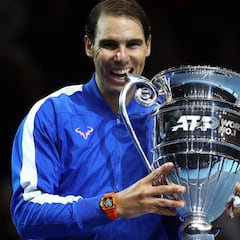Nadal: "I thought that by now I’d be retired and starting a family"
The world number one spoke exclusively to AS about his season, his recent marriage, and how he was told his style would lead to a short career in tennis.
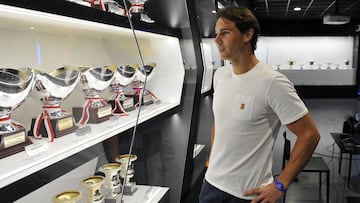
Rafa Nadal spoke exclusively to AS at his academy in Manacor, Mallorca, where the world number one lives, to discuss his successes across the 2019 season and the adjustments he has made to his game to sustain his reign at the top of the game with a fifth year-end number one ranking, matching his great rivalsNovak Djokovic and Roger Federer.
From the outside looking in, you had a sensational 2019. How would you describe it?
It was an emotional season in every respect and in different phases. I went through many things, some of them incredibly positive and others that were genuinely tough. Luckily, there was a moment when I hit a great run of form and I managed to keep it going. But I can’t forgot what happened in the month before then. I had a good year in 2018 in terms of tennis but very difficult on the physical level. I only had good results at seven tournaments. I ended the year as number two and never really reached the level I expected. At the beginning of 2019 I had a quadriceps injury that meant I had to miss Brisbane. These are little issues that you forget about after a while but at the time you’re struggling internally. I went to Melbourne with doubts in my mind but I played fairly well except in the final. I felt good, but then in Acapulco I felt a problem in my wrist and I was only able to train for a day before the tournament started, which was another blow. I lost against Kyrgios, I competed but didn’t win. The treatment I went through worked well but then at Indian Wells I couldn’t play in the semi-finals because of a knee problem. That was the most difficult part of the season because I’d had a lot of injury problems over the past few years.
What was the most satisfying moment of the season for you?
The decision to keep trying, to force myself every day to be able to play. Accepting the bad things, the times when I was playing badly, when things aren’t going your way and remaining positive. It was tough work mentally, above all because of the weight of the objectives I’d set out for myself. In terms of tennis, I was able to adapt to the circumstances and with the help of my team I changed a few things. I started playing much more aggressively. I took an important step forward with my serve during the year, but particularly towards the end of the season. We were set on the idea of playing with more aggression and trying to shift my style of play towards something different.
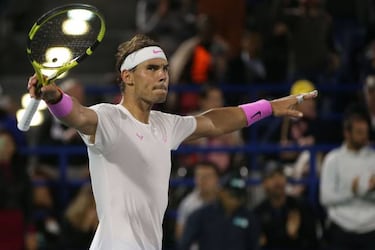
Was your second serve the biggest improvement?
I think the first serve was as well, but it’s true that if your second serve is working well then it gives you more confidence when you’re hitting your first serve. The decisive thing was changing my service action. In the past I’ve had pretty good numbers on my second serve, especially when I was playing a lot more on clay, but I’d never got as much speed on my second serve as in 2019 and I started to feel that the next shot wouldn’t have to be a defensive one but an offensive one. The serve helped me a lot this season. I rarely lost a service game in Paris, London or at the Davis Cup.
Speaking of the Davis Cup, you won eght games in six days in Madrid. Had you ever done anything like that before?
I don’t know, maybe one year in Monte Carlo, when I won in the singles and also in the doubles with Tommy Robredo.
Something about Nadal that is not widely known is that he has an almost photographic memory. That year was 2008 and he won 10 matches in seven days.
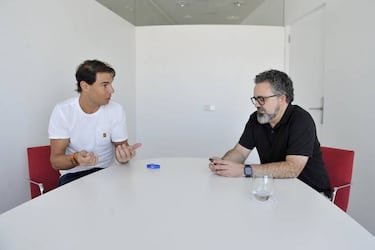
Where does your ability to remember everything so clearly come from?
I don’t really know. I’ve always had a good memory. For example, when I’m playing golf and there are four of us, I remember every shot played by the four of us and where it went. When you do things that are important to you, when you throw yourself into it and live that moment, you tend to pay more attention. Earlier in my career I remembered everything. I never forgot how a single point played out… these days I forget one or two. It’s useful to have a good memory in sport because it helps you to react when you find yourself in a situation you’ve been in before.
A few days ago you really went for it in an exhibition game against Tsitsipas. Is that your own competitive spirit or a result of coaching?
I have been training all my life. I took the game as though it was a tournament game and I do the same with every game I play in. Tsitsipas left it all out there on the court as well and he was furious at the end. [The Mubadala World Tennis Championship] is the non-official tournament we all take most seriously because it’s so close to the start of the season and it’s a good test of where you’re at. For me it was basically a competitive game.
You’ve never lost to Tsitsipas. Is patience something that comes with experience?
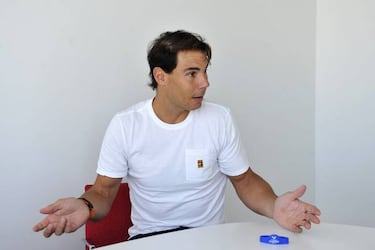
Everybody is different but when I was young my uncle Toni and the rest of my team would never let me smash a racket or show an attitude that was out of place on court. From when I was a kid I was taught that. And when I got older I didn’t allow myself to do it either.
Do you think that 2020 is the year Tsitsipas and the rest of the NextGen players will challenge you, Djokovic and Federer? There’s a buzz around them. And what sets you three apart?
It’s normal that there’s a buzz around them and it will get louder because we’re getting older every day and they’re getting better every day. Every year they’re improving. I think that they can win the biggest tournaments, like Medvedev, Tsitsipas and Thiem did this year. I think that Shapovalov is going to make a big step up this year and Sinner’s trajectory is incredible. They’re here to stay. We’re still around but the cycle of life is brutal and at some point that’s going to change, and sooner rather than later. There’s obviously some reason we have 20, 19 and 16 Grand Slams between us. We’ve been able to find a way to remain competitive and to keep being successful.
What’s the best decision you’ve ever made in your career?
Staying here in Manacor. That’s one of the most satisfying decisions I ever made. When I was young, I had the opportunity to go the High Performance Centre in Sant Cugat [Barcelona] to train, with everything paid for, but I stayed here and even though it meant my family had to make big financial sacrifices staying here to train with my uncle and to grow up surrounded by my family and friends helped me a lot. When I became a professional, it was suggested to me that I might go and live somewhere else because it would have been very beneficial in terms of money. But I decided I’d prefer to stay here and I’ve paid 50 percent tax on everything I’ve earned from tennis in what could have been a short career. I would have made lot more money if I’d lived abroad but I would have been unhappy. At the end of the day it could have cost me more personally to leave. I don’t know if at that time I would have been mentally prepared to leave and ready to train and learn somewhere else. In Spain athletes pay a high rate of tax and a lot of what we earn comes from overseas (with a higher tax rate) but I have never regretted my decision because it also helped me professionally.
You recently got married and said your life hadn’t changed at all…
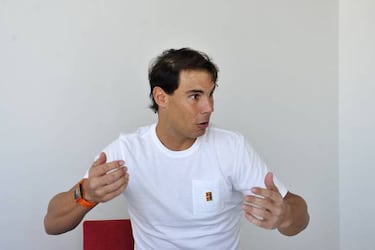
At the moment, no [smiles]…
Related stories
Have you thought about having kids and starting a family?
It hasn’t got anything to do with getting married, it’s to do with age, which you can’t do anything about. To be honest, at this stage of my life I didn’t think I’d still be playing tennis. I was told because of my style I wouldn’t have a very long career. I believed what I was told, so I thought that by now I’d be retired and starting a family. The thing is that I’ve always thought it’s best to have kids when you have a more stable way of life than I’ve had during my playing years. But time is moving on and anything can happen.


